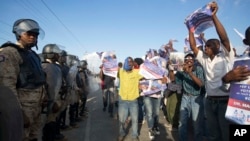The United States is confident that Haiti will move forward with a presidential runoff vote on April 24, a senior U.S. official said in Washington on Wednesday, days after Haitian lawmakers chose a Senate chief as the island nation’s interim president.
Deputy Assistant Secretary of the State and Haiti Special Coordinator Kenneth Merten told reporters the U.S. stands ready to facilitate the electoral process if requested, adding the U.S. has spent $33 million in support of Haiti’s election process.
“As one of Haiti’s many international partners, the role of the U.S. is to support and strengthen democracy in Haiti,” Merten said.
Merten's remarks came after Haitian lawmakers selected Jocelerme Privert as the interim president over the past weekend.
Under an agreement reached by Haitian leaders to install a provisional government, Privert will serve up to 120 days. The winner of the presidential runoff vote on April 24 will take office three weeks later for a five-year term.
Haiti was left without a president when embattled former president Michel Martelly resigned on February 7 under the requirement of the constitution.
The vote to choose Martelly’s successor was postponed over fears of violence.
“The United States supports credible, transparent, and secure elections that reflect the will of the Haitian people, and we believe that only a democratically elected government provides the legal legitimacy to govern Haiti and provides the Haitian people with the transparency we certainly believe that they deserve,” Merten said.
Haiti's political crisis can be traced to last October, when Martelly's favored candidate won the first round of election. Fifty-four candidates were seeking to succeed Martelly. Opposition presidential candidates criticized the polling, saying there were signs of fraud and the ballots were being manipulated illegally.
A second round of voting has since been postponed following mass protests and the opposition's reported refusal to participate in the process.
Haiti is one of the poorest countries in the Western hemisphere. For decades it has been unable to build a stable democracy. Analysts say political turmoil has discouraged much-needed foreign investment for the country’s recovery from a catastrophic earthquake in 2010.









